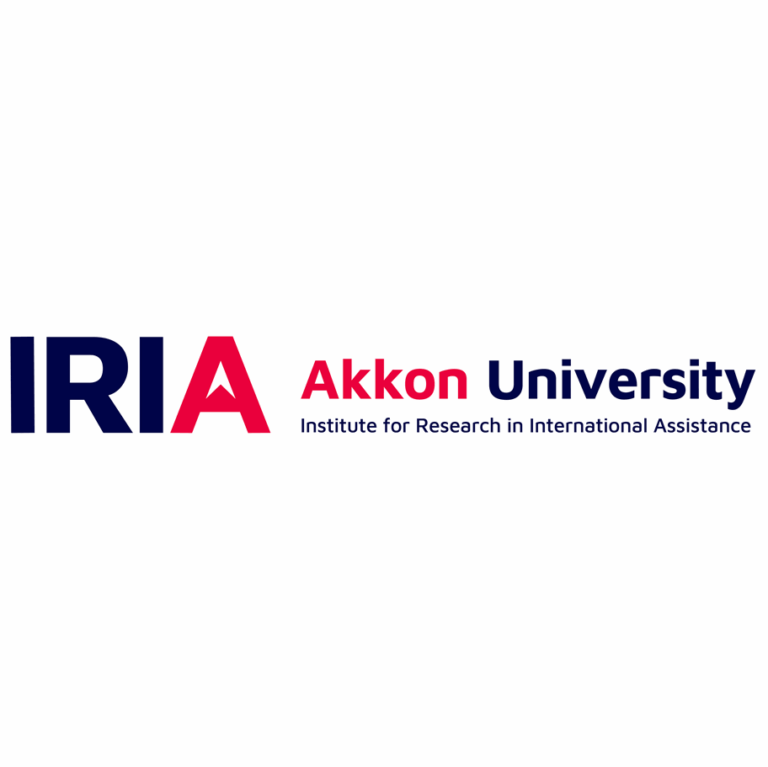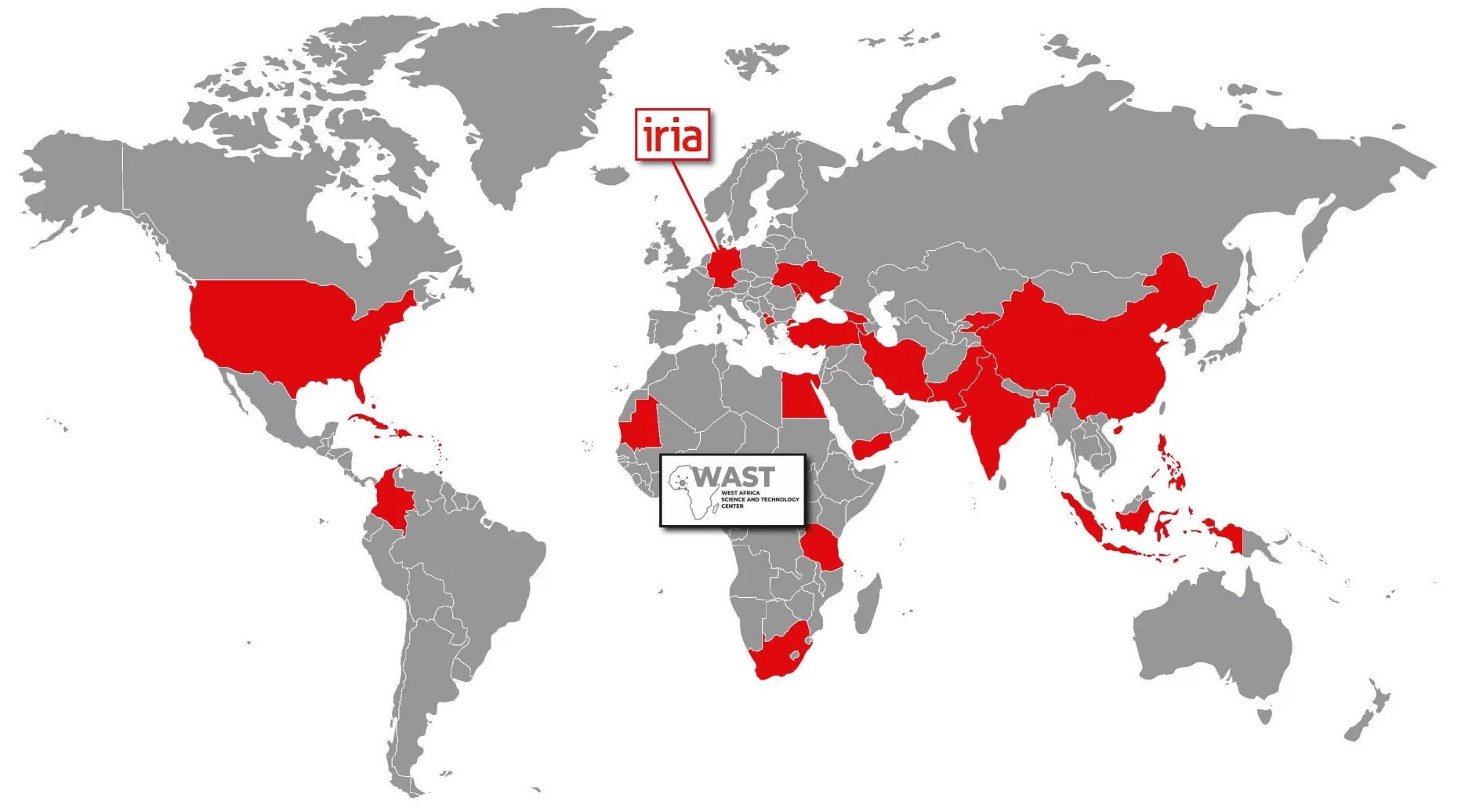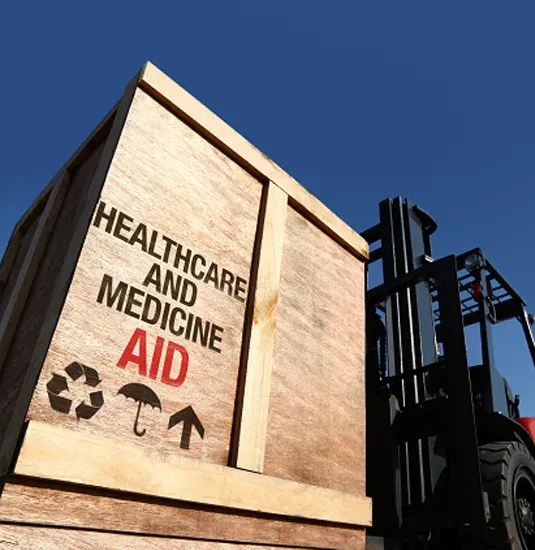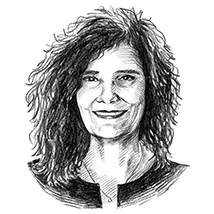Institute for Research in International Assistance



Institute for Research in International Assistance
Crises, disasters and conflict situations increase globally, both in frequency and intensity. Crises become more and more complex, be it acute situations such as earthquakes or outbreaks/epidemics or chronic catastrophes like tuberculosis or drought. To ensure the development of short-term and long-term answers and solutions to the increasing and imminent questions of humanitarian and development aid, Akkon University founded a research institute dedicated to further interdisciplinary and collaborative research in this neglected field.

The Institute for Research in International Assistance (IRIA) at Akkon University focuses on general questions in humanitarian and development aid and thus provides scientific basis for respective political and social debates. In particular, the institute deals with the following urgent research questions in health:
- Restructuring global health to reach the Sustainable Development Goals (SDGs)
- Civil-military collaboration in humanitarian and development aid
- Global health security/diplomacy
- Health care systems in transition, especially in Eastern Europe, Middle East, Central Asia and Subsahara Africa
- One health/Planetary health
- Fighting (re-)emerging infectious diseases
- Training & education of local actors and decision-makers
The projects are financed by third-party funding, e.g. the Federal Ministry of Health, the State Department, the German Research Foundation (DFG) and GIZ. However, IRIA will have to be co-financed by additional partners, and thus we invite you to join and support the basic idea of improving research in humanitarian and development aid!
Statutes of the Institute for Research in International Assistance (IRIA)
Research Report 2024 Institute for Research in International Assistance (IRIA)
News
Unter dem Titel „Indigenes Wissen und Klimawandel: Anpassungsstrategien in Heilsystemen stärken“ setzen sich die Teilnehmenden über einen Zeitraum von sechs Monaten mit den Auswirkungen des Klimawandels auf traditionelle Heilsysteme in Deutschland und Südafrika auseinander. Im Mittelpunkt stehen Fragen des Wissenstransfers, der Verfügbarkeit von Heilpflanzen sowie der medizinischen Praxis im Kontext ökologischer Veränderungen.
Die Projektphase beginnt mit einer mehrmonatigen Forschungsarbeit in Deutschland und wird anschließend in Südafrika fortgesetzt. Das Projekt wird auf Englisch durchgeführt und durch ein ASA-Stipendium gefördert.
Das Angebot richtet sich insbesondere an Studierende mit Interesse an Globaler Gesundheit, Umwelt- und Klimathemen sowie an forschungsorientierter, internationaler Zusammenarbeit.
Thematisiert wurden unter anderem die Rolle Deutschlands in der aktuellen Weltlage, First-Responder-Systeme im Notfall sowie der Einfluss persönlicher Werte und Moralvorstellungen auf Führungshandeln. Der offene Dialog ermöglichte beiden Seiten wertvolle Perspektivwechsel und neue Impulse.
Die Akkon Hochschule versteht zivil-militärische Zusammenarbeit als wichtigen Bestandteil ihrer wissenschaftlichen und gesellschaftlichen Verantwortung und begrüßt den kontinuierlichen Austausch mit der Bundeswehr ausdrücklich.
Vertreten wurde die Akkon Hochschule und das IRIA durch Prof. Dr. Dr. Timo Ulrichs sowie das IRIA-Team, die die Hochschule und ausgewählte Forschungs- und Praxisprojekte vorstellten. Der fachliche Austausch bot Raum für Diskussionen zu rehabilitativen Versorgungsansätzen und internationalen Perspektiven im Gesundheitswesen.
Der Besuch unterstreicht die Bedeutung des internationalen Austauschs im Rahmen von ERASMUS und stärkt die Vernetzung der Akkon Hochschule mit internationalen Partnern in Forschung und Praxis.
Traditionellerweise richtet die Akkon-Hochschule in der Woche vor dem Welttuberkulosetag ein wissenschaftliches Symposium zur Tuberkuloseforschung und -kontrolle aus. Dazu werden die internationalen Kooperationspartner*innen eingeladen, die mit dem Institute for Research in International Assistance (IRIA) an der Akkon Hochschule zusammenarbeiten. Dabei wurden TB-Projekte in der Ukraine, in Georgien, Moldau und Indonesien vorgestellt und zusammen mit Vertreter*innen der WHO und der politischen Entscheidungsebene in Deutschland sowie internationalen Parlamentarier*innen diskutiert.
„Der russische Angriffskrieg gegen die Ukraine hat die TB-Kontrolle in Osteuropa sehr zurückgeworfen. Und die Kürzungen der USA in der Entwicklungszusammenarbeit bereiten uns bei der Bekämpfung von TB, HIV/AIDS und Malaria aktuell große Sorgen“, hielt Timo Ulrichs, Vizepräsident der Akkon Hochschule und Leiter des TB-Symposiums, an der Veranstaltung fest.
Das Institute for Research in International Assistance (IRIA) an der Akkon Universität befasst sich mit allgemeinen Fragen der humanitären Hilfe und Entwicklungshilfe und liefert damit wissenschaftliche Grundlagen für entsprechende politische und gesellschaftliche Debatten. Insbesondere befasst sich das Institut mit folgenden drängenden Forschungsfragen im Gesundheitsbereich, wie der Gestaltung der globalen Gesundheit zur Erreichung der nachhaltigen Entwicklungsziele, zivil-militärische Zusammenarbeit in der humanitären Hilfe und Entwicklungshilfe, Globale Gesundheitssicherheit/Diplomatie und Gesundheitssysteme im Wandel, insbesondere in Osteuropa, dem Nahen Osten, Zentralasien und Subsahara-Afrika.
Prof. Dr. Dr. Timo Ulrichs sprach über die Herausforderungen, die der Konsum weicher Drogen für die Gesundheit und den Lebensstil bestimmter Bevölkerungsgruppen mit sich bringt. Das IRIA Team, mit Partner*innen aus Mexiko, Indonesien, Kanada, Jemen und Deutschland, beleuchtete Themen wie die Legalisierung von Cannabis in Kanada, Zigarettenkonsum bei indonesischen Jugendlichen und Alkoholkonsum in Deutschland.
Die angeregte Diskussion zeigte kritische Perspektiven auf die gesundheitlichen und gesellschaftlichen Auswirkungen von Drogen. Studierende konnten verschiedene Sichtweisen kennenlernen und die Komplexität des Umgangs mit „normalisierten“ Drogen besser verstehen. Ein informeller Empfang rundete den Abend ab und bot Raum für Vertiefung und Austausch.
Am 6. Juli 2024 fand das dritte Treffen des DJAEV Berlin und Umgebung an der Akkon Hochschule für Humanwissenschaften in Berlin statt. Gastgeber war das Institute for Research in International Assistance (IRIA), das In-Institut der Akkon Hochschule und seit mehreren Jahren ein enger Kooperationspartner des DJAEV in den Jemen-Projekten zur Gesundheitssystemstärkung und Gesundheitsprävention.
Der DJAEV ist eine Vereinigung deutscher Ärzt*innen jemenitischer Abstammung, die uns den äußerst schwierigen Zugang zu diesem krisengeschüttelten Land ermöglicht und vor Ort vielfältig unterstützend tätig sein kann.
International Projects and Collaborations

Training a cadre of a young, willing and able workforce in the healthcare industry is key to the strengthening of healthcare systems in a country (Ayanore et al., 2019). Locally-led health research in low- and middle-income countries (LMICs) is critical for overcoming global health challenges. Yet, despite over 25 years of international efforts, health research capacity in LMICs remains insufficient and development attempts continue to be fragmented. According to Franzen et al. (2017) there has been steady progress in LMIC health research capacity, but major barriers to research still persist. Despite an evolution in the development mindset, international actors continue to use non-relevant development models that are not focused to the African setting to solve African challenges. (Franzen, Chandler and Lang, 2017). To change this development thinking, an institute where young African minds can be trained and equipped with the necessary tools and methods to solve the peculiar challenges of the continent in the healthcare sector needs to be established.
Concept:
The West Africa Science and Technology (WAST) Center seeks to bridge the yawning deficit in the quality of trained Biomedical/ Clinical engineers and Public Health Researchers in the healthcare sector. This will be an African initiative open to all individuals, agencies and partner companies seeking to help improve and support the development of training, research tools and methods for the provision of quality health towards the attainment of SDG 3.
The WAST Center will be a not-for-profit, non-governmental organization based in Accra, Ghana, a country that is making great strides in the provision of quality healthcare to its citizenry in the West African Sub Region. The institute will operate with a Public Private Philanthropic Partnership (PPPP) model in collaboration with Akkon University, Berlin, Germany and its Institute for Research in International Assistance (IRIA), founded in 2018 by co-founder Prof. Ulrichs.
The WAST Center shall be open to and collaborate with public and private sector agencies in the pharmaceutical, public health, medical devices, regulatory affairs, research and academic sectors of the healthcare industry in the region, with the sole aim of equipping young African minds with the tools, methods and support to find relevant and sustainable African solutions to the challenges plaguing the African continent, especially facing additional health challenges by the climate change.
This will also significantly improve their employability and chances for the job market in the healthcare sector to feed the companies that the institute shall be collaborating with.
Goal:
The goal of the West Africa Science and Technology (WAST) Center will be:
1.1. TRAINING AND RESEARCH HEALTHCARE TECHNOLOGY
- Assessing the challenges and the need for healthcare technology tools
- Healthcare Technology Management
- Healthcare Technology Assessment
- Training of Biomedical Engineering Students in collaboration with Tertiary Universities on the above topics
- Platform of exchange between students and local and/or international companies
- Advertising of relevant scholarships opportunities to students
- Acting as an innovation hub for companies and students to develop ideas to promote quality healthcare provision in the West African Sub Region through private sector involvement (Hackathons, sponsorship and implementation of BSc and MSc Thesis projects in tertiary universities, mentoring programs and so on)
- Global health aspects
- Practical tools in public health intervention with special focus on (West-)African issues
- Introduction into epidemiology, surveillance and monitoring
- Healthcare system analysis
- Big data and digitalization in public health
- Hospital Planning and Design
- Healthcare Technology Planning
- Public Health Research Services
- International Business Match-Making between local and foreign businesses
The project funded by the Federal Ministry of Health (BMG) is helping to establish such a partnership. With the help of joint research on the consequences of climate change for the health of people in both countries, a basis is to be created. This relationship will then make it possible in future to exchange jointly produced learning content and to promote the health of both nations in the long term.
The aim of the project is to improve bilateral relations in the field of health and climate change between Germany and South Africa. The German-South African cooperation in the field of health consequences of climate change should create practical added value for both countries.
The development and comparison of the climatic and health backgrounds form the basis for joint recommendations for health policy and the population and for the joint development of relevant teaching and training content in medicine, health and nursing sciences. The expected results should serve as a basis for health policy decisions, deepen the university partnership in the aforementioned subjects and serve to sustainably strengthen healthcare. The planned project thus marks the start of a long-term partnership in research and development as well as in teaching and training in the healthcare sector.
Outcome: Increasing awareness of oral health and prophylaxis among medical staff.
„Analyse and creatively process the effects of air pollution“
Partner: Petre Shotadze Tbilisi Medical Academy (TMA)
Outcome: Lectures, panel discussions, writing competition „Human Future!“.
Development policy learning and qualification program for students
Outcome: Research on menstrual experiences and practices of adolescents in Dimapur, Nagaland, India, provides insights and deeper understanding of the challenges
Outcome: Building strong civil society networks and partnerships
Outcome: Health system analysis, cross sectional study on Smoking behavior among University students in Germany and Indonesia, workshop „Outbreak Investigation & Response“, publication „Global health in the network of international research collaborations“, joint lectures and symposia, study visits etc.
Subproject 1
- Joint teaching & preparation of a joint German-Indonesian Master Program in the field of Public & Global Healt
- Bilateral partner projects with Indonesian universities in the Health Sciences
Goal: Initiative for scientific networking and promotion of young talents via Global Health Sessions and Junior Talk Presentations from Iranian and German students in Berlin
Outcome: Innovative reproductive health interventions, assessment, evaluation and publication
Outcome: Development of culturally sensitive educational materials, awareness seminars, visit for collaborative execution
This project on behalf of the Federal Ministry of Health aims at supporting health care in Ukraine by promoting health sciences. A reform of the health care system in Ukraine has been on the agenda since independence of the country and beginning efforts to overcome the post-Soviet Semashko system. The health care system has to face the health challenges of the 21st century. The average life expectancy of Ukrainians is 71.3 years, ten years less than in the countries of Central and Western Europe. Among the deaths due to tuberculosis, Ukraine is at the sad top in Europe. Resistant tuberculosis strains are spreading in Ukraine (WHO Tuberculosis surveillance and monitoring report in Europe 2019). The conflict in the east fuels the epidemic, aggravated by a simultaneous spread of HIV. The biggest challenge for the Ukrainian health care system is the country’s hybrid epidemiological profile: most people are dying from noncommunicable diseases; however, the infectious diseases are still not treated adequately.
Our approach: Reasoning for sustainable personal and scientific relationships, carrying out basic analyzes of the health care system and the conflict situation in Ukraine, as well as establishing partnerships with Ukrainian universities to contribute to medical education and training. We started from established university partnerships such as Ternopil and at the same time incorporated the capital city of Kiev. The work in the subprojects is accompanied and complemented by scientific exchange, also in a series of events coordinated by IRIA.
The IRIA „German-Ukrainian Partner Project“ is implemented in four subprojects:
- Subproject 1: Health System Analysis & Conflict Analysis
- Subproject 2: Joint Master Program Public Health
- Subproject 3: Scientific Partner Projects in Health Sciences
- Subproject 4: International Working Group with the Ukrainian Ministry of Health
Client: Federal Ministry of Health
1) Main challenges in Ukraine
The initiative aims to support healthcare professionals in Ukraine during times of war. Podcasts on a variety of medical topics are designed to support medical and nursing staff as they face common clinical challenges in times of war. Since the Russian invasion, the current burden on the Ukrainian healthcare system has increased significantly. Due to the deliberate destruction of not only medical facilities, quality healthcare for war victims and the general population has become increasingly challenging. In this situation, continuing medical education (CME) is easily neglected.
2) Our approach
Our approach therefore addresses the need for training and information on topics such as trauma surgery, mental health, rehabilitation and emergency medicine.
With support from the German Ministry of Health, we provide medical content based on current German medical guidelines to create short audio podcasts for Ukrainian-speaking health professionals. We disseminate the podcasts to our recipients through existing German-Ukrainian partnerships through local and regional networks.
The project is implemented with the financial support of the Federal Ministry of Health.
3) Our partners
- Ukrainian Ministry of Health
- Academy of the National Health Service of Ukraine
- Ukrainian Universities (e.g. I. Horbachevsky Ternopil National Medical University, Poltava State Medical University, Donetsk National Medical University, Specialist Medical College of Ivano-Frankivsk National Medical University and others)
- UnifiedForHealth (UFH)
- Ukrainian Network
- Regional Public Health Centers
- Experts of the German Health Care System etc.
4) Preliminary results
Since the start of the project until today (as of February 20, 2025), 53 podcast episodes have been published:
- „How the coronavirus pandemic is affecting the global and regional TB response – and how to respond”, Prof. Dr. med. Dr. PH Timo Ulrichs, Akkon University of Applied Human Sciences/ Institute for Research in International Assistance (IRIA)
- „Positive aspects of mistakes in healthcare crises“, Prof. Dr. Ulrike Morgenstern, Akkon University of Applied Human Sciences
- „Hygiene education and protection measures against infectious diseases such as SARS-CoV-2 in wartime“, Prof. Dr. Denny Paulicke, Prof. Dr. Andreas Schönfeld, Akkon University of Applied Human Sciences
- „Selective mutism as a symptom of post-traumatic stress disorder in children and adolescents traumatised by war“, Prof. Dr. Andreas Schönfeld, Prof. Dr. Denny Paulicke, Akkon University of Applied Human Sciences
- „Sudden infant death syndrome“, Prof. Dr. med. Thomas Erler, Ernst von Bergmann Clinic in Potsdam
- „Therapeutic hypothermia of newborns“, Dr. David Szekessy, West Brandenburg Clinic in Potsdam
- „Clinical picture and peculiarities of care in case of traumatic brain injury and subarachnoid hemorrhage”, Kordula Lipinski, a professional nurse in the anesthesia and intensive care unit, Arnsberg Clinic in Menden
- „Mental health under attack – How to re-gain a sense of self-direction“, authors Prof. Dr. Saskia Eschenbach & Prof. Dr. Marisa Przyrembel, Akkon University of Applied Human Sciences
- „Heat-related health disorders”, R. Jendyk & P. Maisel, publisher – DEGAM – German Society of General and Family Medicine
- „Physiotherapy for acute non-specific back pain” (in two parts), Philipp Hilbig, physiotherapist, head of the neurological department at the Heidelberg Therapeutic Centre, co-founder of the Rhein-Neckar Parkinson’s Network, member of the Networks and Healthcare working group of the German Parkinson’s Society (DPG)
- „Caring for people with dementia”, Chiazoka Klare Obasi, professional carer in care and therapy, Master’s degree, Holy Spirit Hospital Cologne
- „New guidelines for the treatment of restless legs syndrome”, Dr. Anna Heidbreder, Neurology Clinic, University Hospital Innsbruck
- „Emergency medical care for seriously injured people at the scene of an accident”, Lino Witte, MD, lecturer in general medicine at the continuing education courses, Munster
- „Tension pneumothorax”, Franziska Jorda, MD, a specialist in visceral surgery and general medicine, Kaufbeuren, publisher – Deximed – Gesinform GmbH
- „Wound assessment and treatment”, Anne-Lena Lutzler, instructor in nursing and healthcare, Heilig Geist Hospital, Cologne
- „Basics of stress and professional burnout in the healthcare system”, specialists from the Berlin Centre for Psychotrauma of the Bundeswehr
- „Schizophrenia”, Jan Dreger, chief physician of the psychiatric clinic in Krefeld
- „Marlborough’s disease or COPD”, Prof. Dr. Torsten Bauer, Chief Medical Officer of the Heckeshorn Pulmonary Clinic in Berlin, President of the German Society for Pulmonary and Respiratory Medicine
- „Burnout. The first steps to healing”, from experts at the Berlin Centre for Psychotrauma of the Bundeswehr.
- „From the family doctor’s office to the intensive care unit – community-acquired pneumonia”, Professor Matthias Pletz, Director of the Institute of Infectious Diseases and Hospital Hygiene at the University Hospital of Jena
- „Antibiotic therapy for community-acquired pneumonia”, Professor Matthias Pletz, Director of the Institute of Infectious Disease Medicine and Hospital Hygiene, University Hospital Jena, Jena University
- „Children and young people in war zones – a multi-level model of psychosocial support”, Dr Thorsten Sukale, Dr Anabel Zwönitzer, Dr Ute Ziegenhain, Dr Michael Kölch, Clinic for Psychiatry, Neurology, Psychosomatics and Psychotherapy in Childhood and Adolescence at the University Medical Centre Rostock
- „Amputations”, Monika Lenz, specialist in general medicine, Neustadt am Rübenberg
- „Emergency stroke care by general practitioners”, Frederik M. Mader and Reto Schwenke, German Society of General and Family Medicine
- „Dealing with trauma and moral conflicts”, from experts at the Berlin Centre for Trauma of the Bundeswehr
- „Recognising depression: a widespread and underestimated burden worldwide”, Ines Heinz, German Foundation for Depression, Leipzig
- „Bacteremia. Staphylococcus aureus”, based on the InfectEd antibiotic podcast created by the Charité Institute of Hygiene and Environmental Medicine with the support of the Institute of Infectious Disease Medicine and Hospital Hygiene at the University Hospital of Jena and the Institute of Hygiene and Microbiology at the University of Würzburg, as well as experts in infectious disease practice and Charité infectious disease students.
- „Vascular trauma”, Dr Birgit Kirsch, Senior Physician at the Clinic for Vascular Surgery
- „Communicating the news of a death: recommendations from the psychology of emergencies”, Prof. Dr Marisa Przyrembel, Akkon University of Humanities
- „Disaster medicine. Earthquake in Turkey and Syria”, Dr Peter Kaub, MD, I.S.A.R. team member
- „Early neurological rehabilitation”, Dr Enrico Kühnle, senior physician for early neurological rehabilitation at the VAMED clinic in Hattingen
- „What did Gustav Mahler die from”, Dr Stefan Hagel, Managing Senior Physician at the Institute of Infection Medicine at the University Hospital Jena.
- „Spinal support – therapy for spondylodiscitis”, Norma Jung, Senior Physician and Head of the Department for Antibiotic Prescription at Cologne University Hospital.
- „Intra-abdominal infections”, Prof. Dr Christian Eckmann, Chief Physician for General, Visceral and Thoracic Surgery at the Hannoverschmidt Clinic in Munden.
- „Nosocomial pneumonia. What comes in and out of the «drawer»”, Prof. Dr Mathias Pletz, Director of the Institute for Infectious Diseases and Hospital Hygiene at Jena University Hospital.
- „Chronic abdominal pain in the interaction between the intestine and the brain”, Dr. Martin Classen.
- „Cough with recapitulation: Pertussis”, Professor Dr. Ulrich Heininger, head doctor for pediatric infectious diseases and vaccinology at the University Children’s Hospital in Basel.
- „Long Covid”, Dr. Daniel Vilser from the University Children’s Hospital in Jena
- „When it gets stuck in the throat – ingestions”, Dr. Martin Laaß, senior physician at the University Children’s Hospital in Dresden and pediatric gastroenterologist and an experienced pediatric gastroenterologist.*
- „Anaphylaxis – when quick help is needed”, Prof. Dr. Margitta Worm and Dr. Lars Long.*
- “Tuberculosis – consumption”, Dr. Ralf Otto-Knapp and Dr. Brit Häcker, experts from the German Central Committee for Combating Tuberculosis
- “Anaphylaxis – when quick help is needed”, Prof. Dr. Margitta Worm, specialist in dermatology, venereology, allergology, head of the university outpatient clinic at Charité, Berlin; Dr. Lars Lange, pediatric allergist and senior physician at the children’s clinic at Marienhospital, Bonn
- “How can you recognize a seriously ill child?”, Prof. Kai O. Hensel, Director of the Centre for Paediatric and Adolescent Medicine, specialist in paediatrics, and Dr. Michael Sasse, specialist in paediatric and adolescent medicine, specialist in paediatric intensive care medicine and emergency physician
- “Skin and soft tissue infections and bite wounds”, Dr. med. Caroline Isner, Chief Physician of the Clinic for Internal Medicine – Infectious Diseases, Head of the Antibiotic Management Department of the Center for Infectious Diseases at the Auguste-Viktoria-Klinikum
- “Sepsis. When the patient feels even worse than before!”, PD Dr. Matthias Gründling, Head of the Clinical Sepsis Research Group, University Medicine Greifswald, Greifswald
- “HIV-associated infections”, Dr. Hartmut Stocker, Chief Physician of the Clinic for Infectious Diseases, St. Joseph’s Hospital, Berlin (Tempelhof)
- “Dementia. The influence of physical activity on age-related mental illness”, Prof. Dr. Ulrike Morgenstern, Akkon University of Applied Sciences, Berlin
- “The integration of relatives in the process of caring for patients in inpatient facilities”, Prof. Dr. Ulrike Morgenstern and Josephine Pannewitz, Akkon University of Applied Sciences, Berlin
- “Loneliness, performance and mental health of students in the healthcare sector”, Prof. Dr. Ulrike Morgenstern and Vanessa Radtke, Akkon University of Applied Sciences, Berlin
- “Learning from experience and shaping digital change”, Prof. Dr. Ulrike Morgenstern, Akkon University of Applied Sciences, Berlin
- “Post-traumatic stress disorder”, Prof. Dr. Jochen Genzichen, LMU University Hospital Munich, PD, Dr. Maggie Schauer, University of Konstanz, PD, Dr. Konrad Schmidt, Charité University Medicine Berlin, Prof. Dr. Thomas Elbert, University of Konstanz
- “Blendend Learning in Nursing Education”, Prof. Dr. Ulrike Morgenstern Akkon University, Berlin, Ricarda Schenk, Project Manager, University Hospital Hamburg.
- “Active care for the prevention of depression in elderly patients”, Prof. Dr. Ulrike Morgenstern, Akkon University of Applied Sciences, Berlin, Dr. Zoé Bollen, University of Bern, Institute of Psychology, Department of Social Neuroscience and Social Psychology
The podcast episodes are available on the National Medical University of Ternopil website and on the educational platform Academy of the National Health Service of Ukraine, as well as on the Academy’s YouTube channel.
The podcast is available here:
Outcome: Tuberculosis Workshop for delegations from Ukraine and Russia as Satellite Symposium of the World Health Summit & Trainee Program for two students
“How to contribute in the reduction of water-borne and infectious diseases in a country that is disrupted by the ongoing conflict and a health system which is operating with less than half of its full capacity?”
Akkon University of Human Sciences with its Institute for Research in International Assistance (IRIA) in partnership with Deutsche Gesellschaft für Internationale Zusammenarbeit (GIZ) GmbH \ Strengthening the Resilience and Participation at Local Level in Yemen Programme (SRPL), which is funded by BMZ, cooperate together in implementing this project in three governorates in Yemen.
Background
Water supply is one of the most urgent problems facing the Yemeni population. The highlands in particular, where the majority of the Yemeni population live, are affected by extreme water shortages. This is caused by several factors which consequently contribute to further drop in the groundwater level. As early as 2009, the United Nations Food and Agriculture Organization (FAO) therefore predicted that Yemen could be the first country in the world to completely lose its groundwater reserves.
Since the eruption of the war in March 2015, Yemen’s overall situation deteriorated due to the military conflict. In 2019, it is estimated that around 19.3 million people have limited access to drinking water and adequate sanitation (IRC, 2019). Moreover, public waste management has also largely collapsed, encouraging the spread of infectious diseases such as cholera, dengue, malaria and so on.
This is where this project’s objective comes in. Through measures in the following fields of activities:
- Water hygiene
- Waste management
- Toilets
The project thus contributes to achieving the Sustainable Development Goals (SDG): SDG 3 (health and well-being) and SDG 6 (clean water and sanitation). It contributes to the prevention of infectious diseases and consequently helps to improve public health. In the medium to long term, a measurable decline in diarrheal and other infectious diseases are to be expected.
Objective
The overall project objective is the prevention of infectious diseases through hygiene measures in the areas of water hygiene, waste management and toilets.
Areas of implementation
The project is designed to be implemented in accordance with the already existing IRIA project “Health System Strengthening, Yemen” to create synergies as well as areas of integration. It will be conducted in three governorates in Yemen namely Hadramout, Ibb and Dhamar.
Effect
The project objective is primarily the prevention of infectious diseases through measures in the areas of water hygiene, waste disposal and toilets. These measures will improve the health of the respective households and village communities in the three governorates. At the same time, it strengthens the resilience and participation of individuals and communities by imparting knowledge, skills and a strengthened ability to help themselves in the three fields of action.
The German Society for International Cooperation (GIZ) and the Akkon University of Human Sciences with its Institute for Research in International Assistance (IRIA) are working together to improve health care in Yemen on a sustainable basis.
A civil war has been raging in Yemen since 2015.
The consequences of this war are dramatic: most of the country’s infrastructure has been destroyed. The health system has been particularly affected. Less than half of the health care facilities are still in operation. More than three million people are internally displaced. The child rights organisation Save the Children reports that 85,000 children have starved to death in Yemen since 2015. The United Nations estimates that 14 million people do not have enough to eat. Around two million children are considered to be at acute risk of starvation.
War injuries and epidemics (diphtheria, cholera, measles) increase the need. Three quarters of the Yemeni population are dependent on humanitarian aid. Every ten minutes a child dies here from malnutrition, disease or the direct effects of war. Many diseases could have been avoided with better essential, qualitatively necessary medical care.
According to WHO estimates, more than 16 million inhabitants have neither access to health care nor to appropriate medication. There is a lack of access to clean water, sanitation and adequate hygiene. Only half of the hospitals are still functioning. Even these facilities can only function to a limited extent due to a lack of staff, equipment and medicines.
The German Federal Ministry for Economic Cooperation and Development (BMZ) doubled its support for Yemen in 2019 to 136 million Euro (2018: 62.5 million Euro). This is primarily intended to improve health care and water and sanitation services.
GIZ has been active in Yemen on behalf of the German Federal Ministry for Economic Cooperation and Development (BMZ) since 1969 and has had its own office in the capital Sana’a since 1983. Due to the security situation, there are currently no German personnel on site. More than 129 Yemeni GIZ employees are continuing many projects.
As early as 2005, GIZ developed a quality assurance procedure for the health authorities in Yemen for the first level of health care, which needs to be further developed to meet the more stringent conditions of current challenges. This project is financed by BMZ and implemented by GIZ together with Akkon/IRIA and the German-Yemeni Medical Association (DJAEV).
The aim of this three-year project is to ensure qualitatively adapted essential medical care at the first level of care and in reference hospitals in Yemen, despite of war and resulting bottlenecks. Beyond quality assurance procedures and continuous quality improvement, practice-tested instruments for quality assurance in the health care system are to be developed for the first level of care, reference hospitals and regional health authorities, as well as to develop key groups and groups of health care professionals. In addition to that the staff of certain institutions and professional groups shall be effectively trained in medical-technical procedures in order to enable them to independently develop, apply and maintain the health-protecting „standard operating procedures“ in the health care facilities.
Please note: For safety reasons, this can only be done from outside. This Yemen project is humanitarian aid and technical cooperation in remote mode!
Outcome: Quality improvement of Primary Health Care Center, hospitals, health institutes & local health authorities; conducting of more than 70 training courses for healthcare staff in the field of clinical management, development of Standard Operating Procedures (SoPs), review and development of clinical curricula, monitoring of practical training of doctors and health staff, workshops to empower women (doctors, nurses, midwives), telemedicine; strong collaboration with Deutsch-Jemenitischer Ärzteverein (DJAEV)
- 2025: Analyzing and creatively presenting the effects of air pollution, country: Georgia, local partner organization: Petre Shotadze Tbilisi Medical Academy (TMA)
- 2024: Promoting gender equality: Implementing educational initiatives on reproductive health (country: Pakistan, local partner organizations: Superior University (SU) and University of the Punjab (PU), Lahore/Pakistan)
- 2023: Health promotion through digital media (Country: Mexico, local partner organization: Escuela de Estudios Tecnicos de Enfermeria A.C. (EETEAC), Saltillo/Mexico)
- 2022: Women Empowerment through menstrual hygiene (Country: India, local partner organization: Community Health Initiative (CHI), Nagaland/India
IRIA presents series of publications: Akkon Schriftenreihe
- Volume 1: Tuberculosis out of control – strategies to fight multidrugresistant-tuberculosis
ISBN 978-3-945735-00-8 - Volume 2: Tödlich trotz Hightechmedizin – Infektionskrankheiten als Herausforderung im 21. Jahrhundert
ISBN 978-3-945735-01-5 - Volume 3: Current Trends in Global Health – documentation and reports from conferences, symposia and workshops 2017
ISBN 978-3-945735-02-2 - Volume 4: Mensch Zukunft!
ISBN 978-3-945735-04-6 - Volume 5: Public Health in Ukraine
ISBN 978-3-945735-05-3 - Special Issue: Current trends in global health-Tuberculosis from the Berlin Declaration 2007 to the Moscow Declaration 2017
ISBN 978-3-945735-03-9 - Volume 6: Global health in the network of international research collaborations
ISBN 978-3-945735-06-0 - Volume 7: Future minds in global health – The International Young Researchers‘ Symposium on Global Health 2024
ISBN 978-3-945735-07-7
Download free of charge. Order address print copy (volume 1-5: 10 EUR / volume 6: 15 EUR plus shipping costs): info@akkon-hochschule.de.
Head of IRIA
-
 Prof. Dr. med. Dr. PH Timo Ulrichs
Prof. Dr. med. Dr. PH Timo Ulrichs- Vizepräsident
- Direktor Institute for Research in International Assistance (IRIA)
- Lehrstuhl für Globale Gesundheit und Entwicklungszusammenarbeit
-
 Gaby FeldmannWissenschaftliche Mitarbeiterin Institute for Research in International Assistance (IRIA)
Gaby FeldmannWissenschaftliche Mitarbeiterin Institute for Research in International Assistance (IRIA)
Research Associates
-
Hala Al-Husaini
Research Associate
+49 30 809 2332-0
hala.al-husaini@iria.akkon-hochschule.de -
Mara Burkhard
Research Associate
+49 30 809 2332-0
mara.burkhard@iria.akkon-hochschule.de -
Philipp Endler
Research Associate
+49 152 384 12406
philipp.endler@iria.akkon-hochschule.de
Corresponding Scientists
-
Dr. Tobias Bensel
Research on Oral Health
Clinical Partnerships (Tanzania) -
Dr. med. Lukas Herrmann
Research on Tuberculosis, Founder UnifiedForHealth e.V. -
Robert Pascal Nunner, M.Sc. Public Health
Research on Health Services, E-Health, First Aid and Emergency, One Health -
Prof. Dr. Marisa Przyrembel
Professor for Clinical Psychology, psychotherapist (cognitive behavioral therapy)
Fellows
-
Dr. Dalia Hyzam
Fellow Humboldt Foundation at Akkon/IRIA
Researcher “Health System Yemen”
Student Assistants
-
Hanan Ahmed
Dentist, Master Student International Health, Charité -
Abdullah Al Haddar
Fellow DAAD for master’s degree in International Health, Heidelberg University



